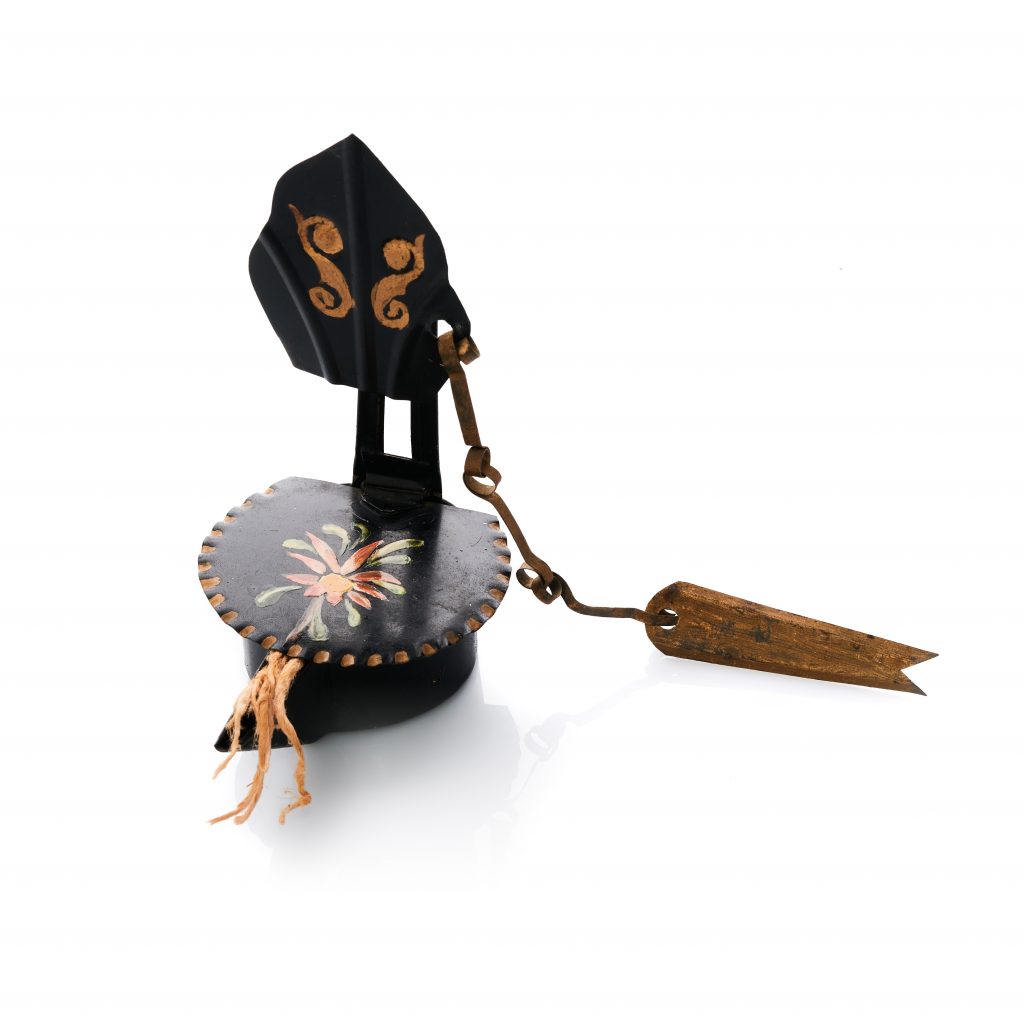Oil Lamp Used by a Converso Family for Lighting Shabbat Candles
Fundão, Portugal, late-20th century
Iron sheet, oil paint, flax wick
Gift of Inacio Steinhardt
Must Know
Belmonte is a small village of 3000 inhabitants in the north of Portugal. The Jews who lived in this village had fled the inquisition, keeping their Jewishness a secret in the belief that the Jewish people had been completely eradicated and that they were the last remaining Jews in the world. The Jewish community in Belmonte numbered around 200 families and for over 400 years they believed that the inquisition had continued.
Compared to Spain, which during the inquisition gave “free choice” to Jews between converting to Christianity and potentially being deported, in Portugal the King and the church forced the religious conversion of Jews. This decision was made in around 1496, about four years after the deportation of Jews from Spain.
This caused the Jews in Portugal to try to find remote places to continue to keep their Jewishness a secret, and this is the reason that Belmonte, a village located close to the Spanish-Portuguese border, was chosen as a place in which to maintain a secret community.
The Jews in Belmonte went to church on Sundays and their children were baptized into Christianity after their birth, but at the same time they followed the commandments of Judaism modestly and privately within the walls of their homes.
They observed Shabbat, fasted on Yom Kippur, separated challah (Hafrashat Challah) and preserved Jewish prayers and poems for generations. Even the preparation of the matzah for Passover was done wisely and secretively, despite the cunningness of the authorities.
More Info
The preparation of the matzah for Passover used to be held at a grand ceremony, the details of which have been preserved to this day by individual families. The household members would gather three days after the start of the holiday in a special room located in the basement which had been specifically prepared for the occasion. All the participants wore white holiday clothes, and the dough was prepared on the floor which was covered in white fabrics with the members of the household kneeling and reciting special poems. Afterwards, the matzot were placed on small fires in the same room and at the end of the process everyone rose, embracing one another with wishes for peace. Just like on Shabbat, the men disguised the preparation of the matzot as card games.
Other customs which could be carried out in Belmonte’s Jewish community’s situation were followed; they built sukkahs inside their homes and instead of putting mezuzahs on lintels, they carried small wooden mezuzahs in their pockets. They refrained from performing circumcisions because it would reveal evidence of their Judaism in a much too incriminating manner.
On the sign for the new community synagogue, the following words were written: “here in Belmonte the candle never went out… here, in our houses, the Jewish commandments were kept secret, for five hundred years… here the Jewish soul was not lost… here the Jewish soul remains forever”.
The illusion of the Jews of Belmonte was shattered when a Polish Jew names Shmuel Schwartz arrived in the town in 1917 as part of his work as a mining engineer. According to his testimony, when he arrived the anusim [legal term of Jews in halakha who were forced to abandon Judaism against their will] were surprised to see a man publicly call himself a Jew with no attempts to hide his faith. The Jewish community which had been trapped within the story they had been telling themselves for centuries, tested Schwartz and his Jewishness. When Schwartz stated the name of God in hebrew, the villagers accepted and ruled, excitedly, that he was a Jew..

